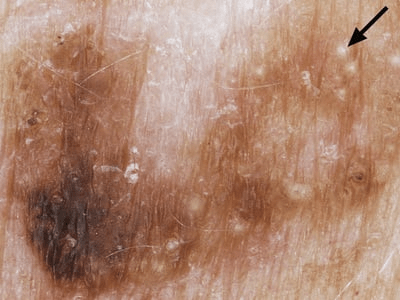This is the term for an SK that has become slightly swollen and developed an irregular, red flare in the surrounding skin.
What is an inflamed or irritated seborrheic keratosis?
The most common kind of benign acquired vascular proliferation, arising as papules most commonly found on the trunk, usually starting in the 4th decade.
What are cherry hemangiomas?
These lesions are 3-10mm, raised, hard, pink/brown growths most commonly found on the pretibial region of the lower legs. Their most common etiologies are a reaction to trauma, insect bite, or viral infection.
What are dermatofibromas?
This is a smooth, waxy, hairless, papillated growth on the scalp that presents at birth or in early childhood.
What is a nevus sebaceous?
This variant of SK are found on the lower legs and dorsal feet. They are 1-10 mm in size, round, and dry with a stuck-on appearance.
What are stucco keratoses?
These growths are small yellow papules that may become dome shaped and umbilicated over time. They may have telangiectasias and become mistake for a BCC.
What are sebaceous hyperplasia?
This is an abnormally large scar but confined to wound site occurring early after injury (usually within 4 weeks) and regresses with time, does not contain collagen bundles.
What is a hypertrophic scar?
This is a mobile cyst of the scalp that is made of a different of keratin that an epidermal cyst. There may be a genetic predisposition.
What is a pilar cyst?
This sign describes the sudden appearance of SK's or a sudden increase in number and size of SK's which may be a sign of internal malignancy.
What is the Leser-Trelat Sign?
These are common, benign, tiny (1-3 mm) epidermal inclusion cysts made from keratin, with a characteristic porcelain-white color, and they are typically found on around the eyelids of adults.
What are milia?
This is an abnormally large scar but extends beyond the wound site occurring later in wound healing phase and does not usually regress, comprised of large collagen bundles.
This is a benign firm 2-6 mm nodule on the helix or antihelix that is often painful. It can develop a central scale and mimic SCC.
What is chondrodermatitis nodularis helicus? (CNH)
This is an area on the body where an SK in not capable of being present.
This type of growth is a 2-3 mm brown/black papule occurring most commonly in skin types IV-VI, starting on average in the second decade of life. They have a genetic predisposition and are thought to be related to SK's.
What is dematosis papulos nigra?
This is the name of the sign seen when a dermatofibroma retracts as a result of compressing/elevating the lesion with the thumb and index finger.
What is the dimple sign?
This is the most common malignant tumor that develops in a nevus sebaceous.
What is a BCC?
 Smooth-surfaced, dome-shaped SK's may have these white or black pearls of keratin, that are 1 mm in diameter, and are embedded in the surface.
Smooth-surfaced, dome-shaped SK's may have these white or black pearls of keratin, that are 1 mm in diameter, and are embedded in the surface.
What are horn cysts, psuedo-horn cysts, or horn pearls?
This type of growth is a benign sweat duct tumor that appear as small, firm, flesh-colored papules that most commonly occurs on the lower eyelids. There is often a genetic predisposition.
What are syringomas?
This is a side effect of overtreatment of keloids/hypertrophic scars with intralesional kenalog.
What is skin atrophy/telangiectasias?
This is the most common benign tumor that develops in a nevus sebaceous.
What is a trichoblastoma?